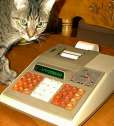Texas Instruments BA-54
| Datasheet legend
Ab/c:
Fractions calculation
AC: Alternating current BaseN: Number base calculations Card: Magnetic card storage Cmem: Continuous memory Cond: Conditional execution Const: Scientific constants Cplx: Complex number arithmetic DC: Direct current Eqlib: Equation library Exp: Exponential/log functions Fin: Financial functions Grph: Graphing capability Hyp: Hyperbolic functions Ind: Indirect addressing Intg: Numerical integration Jump: Unconditional jump (GOTO) Lbl: Program labels LCD: Liquid Crystal Display LED: Light-Emitting Diode Li-ion: Li-ion rechargeable battery Lreg: Linear regression (2-var. stats) mA: Milliamperes of current Mtrx: Matrix support NiCd: Nickel-Cadmium recharg. batt. NiMH: Nickel-metal-hydrite rech. batt. Prnt: Printer RTC: Real-time clock Sdev: Standard deviation (1-var. stats) Solv: Equation solver Subr: Subroutine call capability Symb: Symbolic computing Tape: Magnetic tape storage Trig: Trigonometric functions Units: Unit conversions VAC: Volts AC VDC: Volts DC |
| ||||||||||||||||||||||||||||||||||||||||||||||||||||||||
Texas Instruments BA-54
 The BA-54 is functionally identical to the BA-55 calculator, but without the printer port.
The BA-54 is functionally identical to the BA-55 calculator, but without the printer port.
The programming model of this calculator series is extremely simplistic; programs up to 40 steps in length can be written, using one of the data memory registers for each 8-step block. Programming is not available when the calculator is in the cash flow or statistical mode.
My favorite programming example, the Gamma function, is somewhat difficult to implement on this machine, since in addition to the small program memory size, the calculator also lacks the π constant function. Nevertheless, the following program is capable of computing the logarithm of the Gamma function to more than 5 digits of precision for arguments over 4.
00 65 × 01 61 STO 02 01 1 03 59 lnx 04 75 - 05 71 RCL 06 01 01 07 95 = 08 91 EXC 09 01 1 10 54 1/x 11 55 ÷ 12 01 1 13 02 2 14 65 × 15 81 SUM 16 01 1 17 07 7 18 05 5 19 93 . 20 03 3 21 09 9 22 08 8 23 95 = 24 53 √ 25 59 lnx 26 85 + 27 71 RCL 28 01 1 29 95 = 30 13 R/S 31 37 RST

